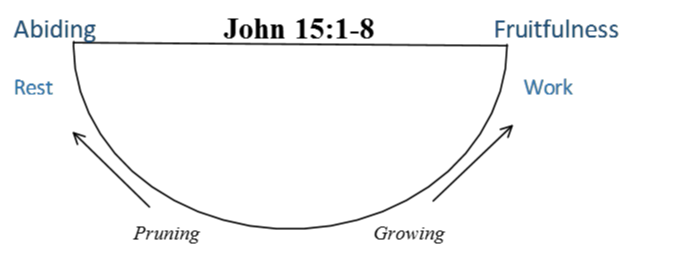
Mike Breen writes, “We cannot bear fruit if we do not spend time abiding. But we cannot simply stay put in the abide mode, for a branch that does not eventually bear fruit will be cut off and cast into the fire.”[i] He then unpacks a powerful image of how grapes were grown (perhaps are still grown?) in the first-century:
At the time of Jesus’ incarnation, a vine would be cultivated, planted,
and left to grow for three years before being allowed to bear fruit. Every
time it tried to bring forth a bunch of grapes, it would be cut back. After
the third year, the grapes would be allowed to grow on their own. By
then the branches were strong enough to support the weight of the
grapes without breaking. After the harvest, the branches were pruned
back for a time of nourishment and rest before the fruit-growing season
began again.[ii]
Likewise with our faith: Let’s get after kingdom building by sharing our faith with those in our spheres of influence and by teaching our groups for transformation toward deeper worship and bolder evangelism. But do not forget to abide in the presence of your Savior: REST. The most effective teachers are those who simply share with their groups what the Lord is teaching them through their lives and study, so be sure to allow sufficient time in your daily life for the Lord to teach you.
Imagine a pendulum swinging back and forth from “Abiding” to “Fruitfulness” which makes the semi-circle shape; thus, we have a visual of the rhythms in kingdom living. We have to find the proper balance between our work and our rest, and perhaps more importantly, our kingdom work and our kingdom rest. This truth goes double for those in local fellowship leadership positions.
We were designed to work (Genesis 2:15), so that it is right and good to work. Remember that the toil of work was a result of the Fall rather than God’s good design (Genesis 3:17-19). But, like every other good gift of God, we pervert the gift to make it an idol as a function of our sinfulness. Christ offers a corrective in John 15:1-8. Jesus says, “Remain in me, and I will remain in you. No branch can bear fruit by itself; it must remain in the vine.” So, in order to do the work to which Christ has called us, we MUST abide (see rest) in His presence (see person and work). In so doing, we will be convicted of sin in our lives, convicted of our various idolatries, become more sensitive to the Spirit’s promptings, and discern our call better. Then we put all of that into action through the work we’re called to do.
[i]Mike Breen, Building a Discipling Culture, 2nd Ed. (Pawleys Island, SC: 3DM Publishing, 2011), 92.
[ii]Ibid., 92.
May
22
By Paul Wilkinson
